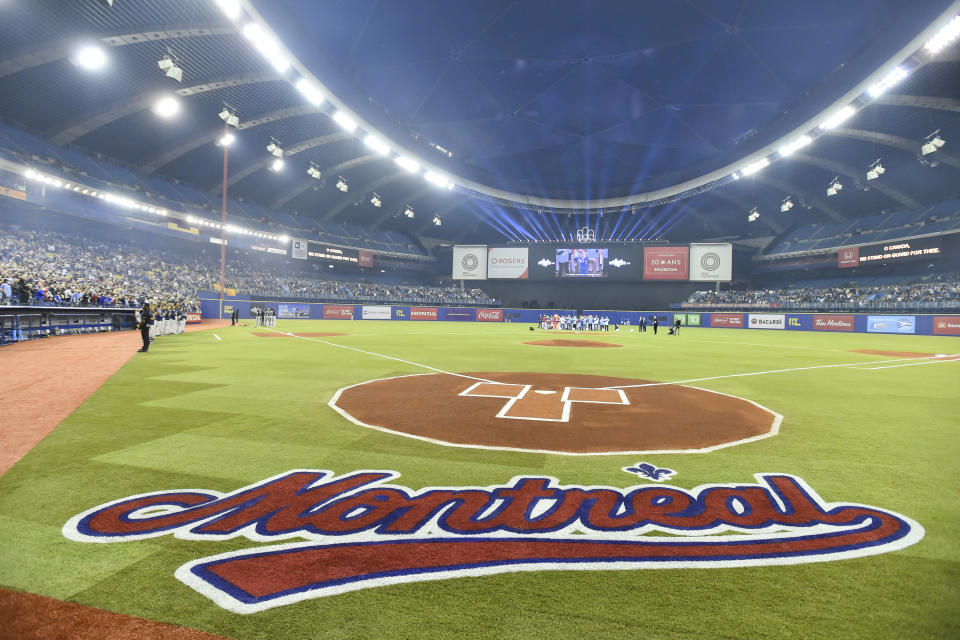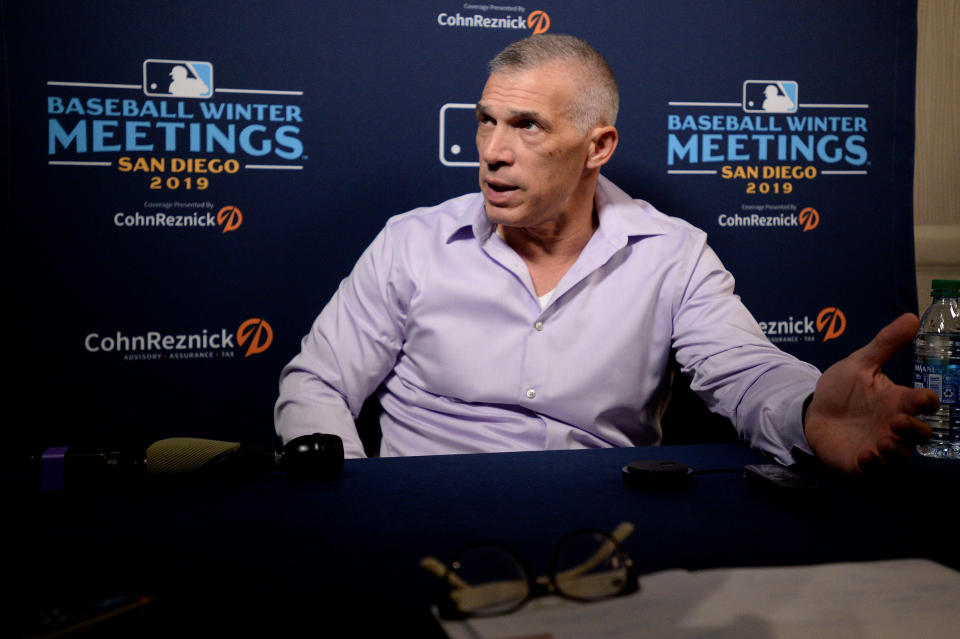The Pen: How baseball might change in the 2020s
Baseball has such a long history of proud consistency and a culture built on self-referential comparisons between eras. From a distance it’s defined by sameness across centuries, but when you zoom in, it feels like we're always in a moment of pivotal — and controversial — change. That was true of the last decade (10 years ago there wasn’t even in-season testing for human-growth hormone, only the Los Angeles Angels were interested in a young man named Mike Trout, and instant replay applied only to home runs) and it will certainly be true of the 2020s.
For instance: an overhaul of the way pitch selection is relayed and even who does the relaying. On Monday, I reported on Major League Baseball’s plans to test prototypes as soon as this spring for technological communication of pitches. We don’t know yet what that will look like — wearable random number generators, lights in the mound, or something else entirely — but I’m sure its implementation will be contentious and hand-wring-y and full of opportunities to lament the state of a once-great game.
I, for one, am looking forward to it. Implicit in that news was another forthcoming change. MLB (in this case that means people within the commissioner’s office) expects teams to shift toward having coaches in the dugout calling the game instead of catchers behind the plate. The various trickle-down effects — making the backstop more of a filler role for another offensive powerhouse — are fascinating, both fun to predict and exciting in their exhaustive unpredictability. Baseball doesn’t change so much as evolve — developments in the wider world beget necessary reactions which beget adaptations or even exploitations and counterstrikes and codifications and overcorrections, and the whole process is constantly acting on all areas of the game in perpetuity.

In the spirit of all this and the new decade, here are a handful of (arbitrary and largely uninformed) predictions for baseball in the 2020s:
1. Robot umpires will arrive and … it won’t be that big a deal.
That automated strike zones will arrive is too safe a prediction. With apologies to traditionalists, robot umpires are coming and at this point they probably can’t be stopped. Live-game testing took place in the Atlantic League and Fall League this past season and although at least one player tried to argue with a computer, there weren’t riots. Baseball was played. Games were won. There were, naturally, kinks to be addressed and concerns over the strike zone’s specifications — and before the TrackMan automated strike zone gets its call to the show, the system will be made as consistent and accurate as possible.
With an umpire still standing behind the plate, still motioning after each pitch to relay a call that no one saw him receive via an earpiece, I bet … it won’t matter much at all. If the robot umpire is any good, there should be nothing to notice. Ostensibly, there will be less to notice about ball-strike officiating than there was previously.
Oh, I’m sure fans will still experience the cathartic frustration of a call going against them by complaining about how a human might have given their ace the benefit of the doubt on that close one, but ultimately robot umps will go from a punch line to the subject of think pieces to just part of the fabric of the game over the next 10 years.
2. Montreal will get another baseball team.
The Washington Nationals’ championship run was a useful reminder that in an age of impersonal, often mechanized advancements like, well, robot umpires, there is still a powerful sense of romantic nostalgia for baseball in Montreal. And although the powers that be can’t necessarily script a narratively satisfying on-field product, they can control the long arc of this particular storyline. Which isn’t to say that a baseball team will be bestowed upon Montreal out of sheer benevolence, but rather that at some point in the course of worrying about baseball’s waning popularity it probably makes sense — moral, fiscal, logical — to give a team to a city that’s clamoring for one.

Intentionally or not, the Tampa Bay Rays’ ill-conceived split-season plan probably served as an important test balloon for interrogating the local corporate and political interest in supporting said team. Which means the only question is: Will it be an expansion team in Montreal, or will the Rays be permanently relocated?
3. Mike Trout won’t win a championship.
Sorry, Mike, gotta go with precedent here.
4. There will be at least one player-manager.
Alright, let’s get weird. Ten years is a long time and a lot can happen. Issuing exclusive predictions that are clear logical endpoints of current developments or continuations of contemporary trends is too safe. So let’s try to extrapolate wildly.
Managers are increasingly figureheads for their teams — important figureheads who often receive outsized credit for bad decisions and who are responsible for one of the most armchair-analyzed aspects of the game (when to bring in which reliever), but figureheads nonetheless. Their job is to connect with the clubhouse, liaise with the front office and explain all that to the public. Incidentally, we’ve seen a recent return to notably long contracts for proven stars who will not be old in the sense that they’ve lived a substantial amount of years by the end, but who will be old in the sense that certain segments of the notably less athletic general public will complain about how the player is past his prime.
Why not let some aging slugger whose best years are behind him (but whose best years have also earned him the admiration of the clubhouse and the city) do double duty as DH or backup catcher and manager? What about for a bad team with not a lot else going on? What if Gabe Kapler doesn’t work out in San Francisco, either? Why not have Buster Posey split time behind the plate and in the manager seat? (Are you letting a guy who hit seven home runs last year play first in his mid- to late-30s when so much of his value is as a leader on the team?)
5. The baseball schedule will shift to lessen the environmental impact of all that cross-country travel.
And now, a little optimism. If there’s still baseball to write about in 10 years and the entire global population below the 1 percent is not consumed with the increasingly imminent climate Armageddon (see, optimism), it’ll be because massive companies that actually have the power to impact these things got serious about sustainability in a big way (or because the government forced them to) by simply flying less and staying put longer. Hopping between cities for every three-game series will look increasingly irresponsible and those will disappear as the norm.
Studies have shown that carbon emissions from air travel are outpacing predictions, that the United States is responsible for almost 25 percent of the global impact of air travel, and that domestic flights are a bigger contributor to the carbon footprint that is often assumed. The thing about air travel is: it’s often really important socially, culturally and economically. Still, individuals and the aviation industry should do what we and they can to limit unnecessary flights in the future. In other words, dozens of private flights around the country every three days for months on end, for sport, is definitely making matters worse in a small but significant way that could and should be addressed.
Attempts to do so will feel extreme by baseball measures! Maybe teams play one long series a season against each other — “Welcome to the broadcast, Dodgers fans, it’s Phillies week!” — which will seem like a drastic erosion of season-long drama. On the other hand, the entire planet and species is at stake.
Notes from the clubhouse

At the winter meetings in San Diego, I spoke to several managers about how the paranoia around sign-stealing has already affected the communication between pitchers and catchers, and how they feel about a future in which that communication is done electronically. This was before I knew exactly what MLB was considering but I was still curious what they’ll do in the short term, and how they view the viability of a long-term solution. Given the newsiness of their commentary, we’re dedicating more of the column to quotes this week.
Colorado Rockies manager Bud Black, on whether teams will take more precautionary measures in the wake of the Astros sign-stealing scandal: “I think that’s already been happening. I know that we as a staff have been creative with our communication sign-wise from the catcher to pitcher and pitcher back to catcher. And we’ve also noticed other teams doing the same — multiple sign sets, even with no one on base to try to really stop the espionage.”
Rays manager Kevin Cash, on how he’ll have his battery manage their signs next season in the wake of the Astros sign-stealing scandal: “We’ll just change them over and over and over — inning by inning, batter by batter.”
Incoming Philadelphia Phillies manager Joe Girardi, on proactive plans to communicate defensively: “I think for us, I’ll bring something new to our team in spring training and say we need to do this in spring training so when we get to the season there’s no mess-ups — how we’re changing signs all the time and how each pitcher is going to have a number of signs that they can go to. Really honestly, for me, every two or three pitches you change it if there’s a runner on second.”
Girardi, on whether he would like to see a switch to a technological means of communication: “I would have liked to see it two years ago.”
Girardi, on whether he thinks there needs to be a technological fix as technology increasingly plays a role in sign stealing allegations: “I do. I think it’s figuring out the technology behind it. I don’t think it’s so much having an earpiece that’s a problem. I mean, our players wear earpieces every day. They’re in the gym, they’re stretching, they’re eating, they’re talking on the phone, they’re running on the treadmill. They have earpieces on all the time! Half their life is in earpieces. So it can be done, it’s just figuring out the technology.”
Los Angeles Dodgers manager Dave Roberts, on technology changing the way pitchers and catchers communicate: “I think we’re a ways off from that. I think the first step, the commissioner’s office is really trying to be on top of the electronics and how to combat sign stealing as far as kind of giving signs electronically, I think we’re a ways from that … [O]ur hope is we don’t have to go there.”
Minnesota Twins manager Rocco Baldelli, on whether his pitchers and catchers will communicate differently going forward, whether they will change signs more frequently: “The answer to that is yes, just flat out yes.”
More from Yahoo Sports:

 Yahoo Finance
Yahoo Finance 
